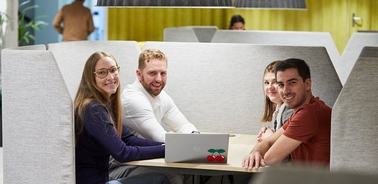- Home
- News And Events
- News
- Ie Sustainability Foresight Challenge: A Hands-on Experience To Drive Impact
IE Sustainability Foresight Challenge: A hands-on experience to drive impact

Global Online MBA students put their strategic thinking to the test.
IE Business School recently put Global Online MBA students to the test with the IE Sustainability Foresight Challenge. This three-day experience of sustainable development was the perfect opportunity for them to trial their studies in a hands-on learning environment.
The IE Sustainability Foresight Challenge took place in Madrid, with participants attending workshops and lectures, group forums and working alongside their classmates to create a five-minute elevator pitch for a real-world solution to today’s sustainability issues. The event culminated in a lecture from Adjunct Professor Jaime Oliver Huidobro—founder of Epoch Metrics—followed by presentations from eleven student teams.
Huidobro’s lecture covered AI in sustainable development, showcasing both the risks and opportunities. “We’re not achieving what we said we’d achieve in the SDGs, which is hard data to analyze,” says Jaime. The most pressing challenges included climate change, biodiversity loss, financial constraints, economic inequality, poverty, educational gaps and cultural resistance to change.
“In order to train AI today, we need a lot of energy. And if this energy is nonrenewable, we will pollute a lot,” explains Jaime. He urges students to look at the opportunities of AI in working toward sustainability, such as using it to strengthen resilience and create preventative AI systems to predict climate-related hazards. “Monitor, optimize and predict; this is the best way to utilize AI moving forward,” he notes.
Following Jaime’s presentation, students gave their five-minute pitches. There were 11 teams to present, and each received a question from two of the three judges present. Here are some of the projects they proposed:
- Ridyadh Re-imagined talked about tackling climate change and biodiversity laws with AI technology, which included satellite imagery and air quality monitors.
- SmartSave presented a circular economy idea to reduce food waste with an in-home sensor and app.
- Build Beyond dove into why sustainable building matters and using recyclable products like bamboo and recycled insulated concrete.
- Reloop worked toward solving the lack of traceability regarding recycling, which leads to 92 million tonnes of textile waste each year.
- Oceanedge, created an infrastructure where land ends and smart cities begin, in order to solve the problem of sinking cities due to rising sea levels.
- Deep Blue worked to tackle the problem of global fish stock overfishing by tapping into marine optimization and monitoring fish movement.
- Agriculture Ltd. pitched an autonomous harvester that captures carbon dioxide from the air and soil and converts it into usable fuel onboard.
- Nano Pura explored wastewater challenges in big pharma, creating a highly efficient purification system with sustainable and reusable materials.
Each team was praised for their efforts, but three teams stood out to the judging panels for their exceptional innovation:
- Bundai.Block focused their efforts on textile waste, specifically Pakistan's 270,000 tonnes per year. Using cellular pulp tech to shred clothes and recycle effectively, the project will reduce greenhouse gas emissions, chemical leaking and extensive land use from landfills and incinerators.
- Verdonia dove into driving sustainable access to food and energy through technology by producing green ammonia in an alternative way, reducing the cost by more than 50%.
- Gaia Print worked to save global ecosystems with 3D-printed mangrove structures. By mimicking natural structures to encourage sediment deposition, these bio-printed tentacle-root structures would ensure that mangroves are planted and monitored throughout their lifecycle.
Opportunities like the IE Sustainability Foresight Challenge give IE Business School its edge in higher education. With continued initiatives to help students develop an innovative and global mindset, graduates enter the world of work with firsthand experience of finding solutions, pitching ideas and making them a reality.